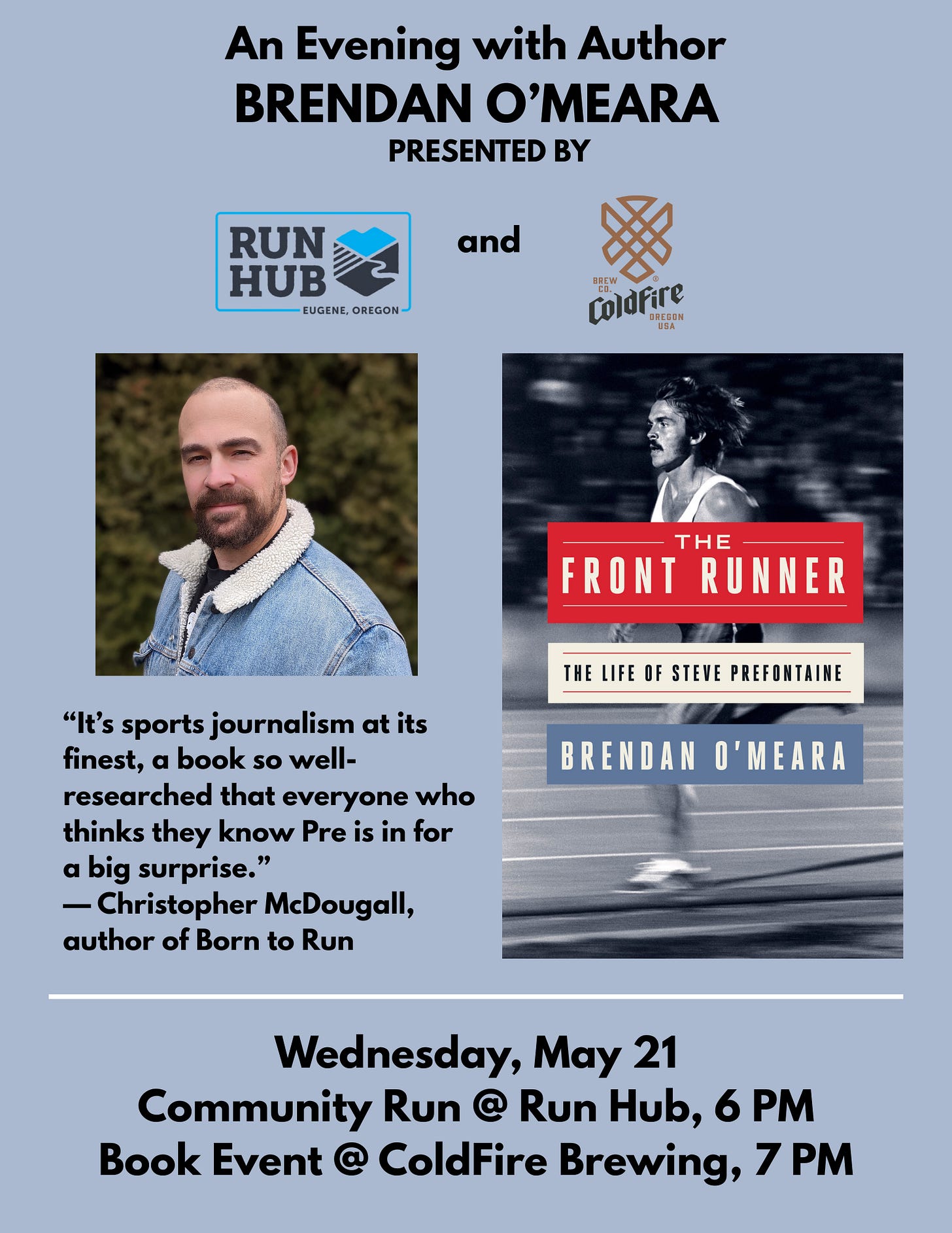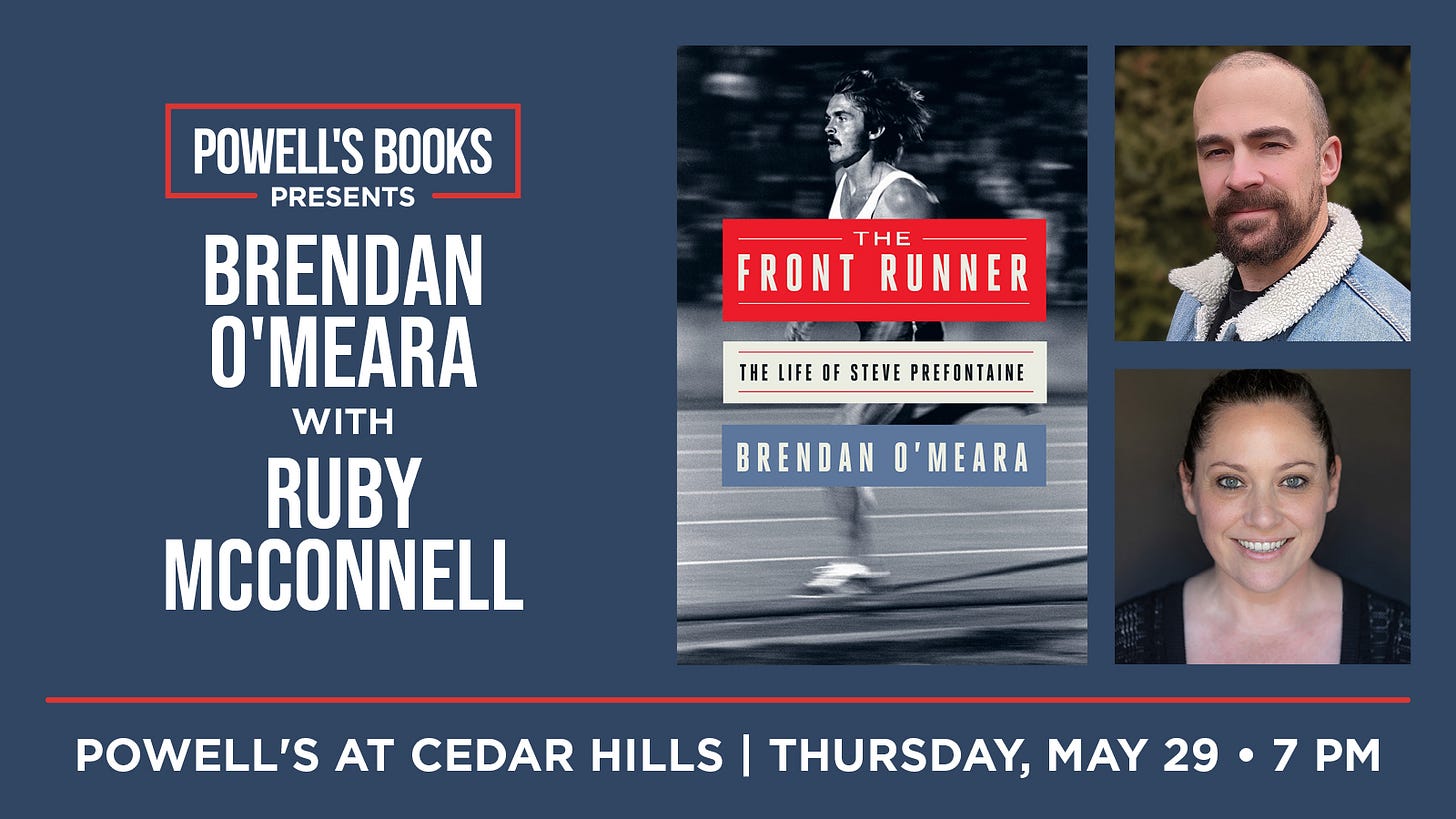Listen on Apple Podcasts, Spotify, YouTube, or wherever!
Personal News and/or Professional News and/or Shoutouts for Pals
The Front Runner: The Life of Steve Prefontaine is available for pre-sale. I ask that you consider it. Publisher’s Weekly calls it, “Nimble and comprehensive, this is a stirring tribute to a generational runner gone too soon.” That’s nice.
Lit Hub featured it as a top ten book to read in May, “surging prose,” well, fuck.
Events!
- Wednesday, May 21, 6 p.m., Pub Day 5K with Run Hub in Eugene. Three-five-mile run, then we head over to nearby ColdFire Brewing at 7 p.m. for a book talk/signing/.

- Thursday, May 29, 7 p.m., at Powell’s Books at Cedar Hills Crossing, in conversation with Ruby McConnell

My friend Kim H. Cross, who I owe just about everything to, is co-instructing a workshop called Feature Writing: The Reconstructed Narrative with Hampton Sides and Glenn Stout at the Archer City Writers Workshop May 28 to June 1.
A mostly accurate transcript for Ep. 4681
“There is something to be said about saying ‘this is what I want to do.’ My brother’s a cinematographer, and I am one of six kids, and I’m the youngest, and I remember watching him and watching everybody say, ‘what are you doing? You’re not going to be able to do this.’ And he looked at me and said, ‘This is not just a game of talent. Yes, you have to have talent, but it’s really about, are you going to put your head down and do this thing? Because ultimately, other people are going to quit.’ You have to put your head down, forge forward. It’s going to be messy. It’s not always going to work, but the longer you are willing to stick with it, the more likely it is going to happen. And some of that is because some of the most talented people we know will quit, and the people that we see are the people who were consistent and kept getting up and kept saying, this is something I’m going to do.” — Maggie Messitt, from Ep. 468
Today I welcome back to the show Maggie Messitt. You remember her? From Ep. 8 that aired back in 2015, right? That’s right, Episode 8. Maggie and I have known each other close to 20 years now, which when I say that out loud kinda makes my head hurt.
We met at Goucher College’s Creative Nonfiction MFA program in 2006, my first year, her second, I believe. And for twenty years we’ve been these neighboring moons on a faraway a planet. She knows full well the breadth of my frustrations and bitterness in this line of work. She always tried helping me with querying, back when I was trying all kinds of keys to unlock the doors before I said, Fuck it, I’m building my own house.
Her latest book is Newspaper from the Object Lessons series from Bloomsbury. Maggie chronicles in curated detail the 400-year history of newspapers in the United States and South Africa. It’s a trippy little book. Maggie also is the author of The Rainy Season: Three Lives in the New South Africa, a work of immersion (she loves that word) journalism living and starting a newspaper in South Africa. She was the founding national director of Report for America, a national service program that places emerging journalists in newsrooms across the country addressing critical coverage gaps and the changing landscape of local news.
We talk about her latest book, but also the arc of her career and mine over the last ten years, how her relationship to ambition has changed, how historically journalists didn’t really make that much money and it was more a of a need to share information (not necessarily this career we’ve come to know), and the compulsion of writing books.
I don’t know, CNFers, I have a special bond with Maggie. I don’t know what it is, but I feel a kind of kinship with her, always have. Not sure if SHE feels that way, but it’s always something that I’ve held onto since we first met when we were just kids, man, just kids.
On sharing information …
“The one aspect that really makes me have hope is that it doesn’t matter what the circumstances are, people are driven to share information, and it doesn’t matter how much pressure is being put on them to not share that information. People have always found a way.”
On community …
“I really am invested in seeing people like all of these heroes in my in my opinion, that sort of dot throughout the book, people who are going to say, ‘I have to figure out how to find a way to serve my community,’ and it’s not going to look like what it looked before, and the iterations over time have shifted. But ultimately, we have to continue to reckon with the fact that it didn’t start with objective news. It started with editorial. It stayed with editorial for hundreds of years. This idea of the objective truth is new, but sitting and listening to people isn’t new, and actually articulating what makes people worried or what’s just happening down the street isn’t new, but this objective truth is new, and this idea that mainstream news is serving everyone is this new fangled thing we call mainstream media.”
On shutting up and listening …
“So The Rainy Season” represented my 20s and and figuring this out, and figuring out what I consider and constantly try to preach, which is shut-up-and-listen journalism where you’re just sitting and observing and hanging out with people and trying to understand a time and place.”
On how long things take vs. actually working on a thing …
“I spent the next 10 years working on a missing persons case, which I am finally finishing and willing to let go of. To be completely transparent, as all of us should, I was not working on that for 10 years, right? I was working on that for fits and spurts, and that took 10 years, and all of these other things, life, work, etc, fits in between.”
On figuring this out …
“I don’t think I figured anything out.”
On slowing down …
“When I came back into the country, one of the things I did was give myself permission to slow down, to take a deep dive into literature, to think about the ways in which people tell very complicated true stories in non-traditional ways. And so I’m much more interested, and probably have for the majority of my life, identified more as a nonfiction storyteller than as a journalist.”
On joy …
“I need to figure out how to do this and be joy filled about it, and feel like I’m able to do it. The joy is I’m able to wake up every day and do this, and I’m not an accountant and I’m not a lawyer and I’m not a doctor in the way my father would like me to be, and I can figure out somehow to still do this thing.”
On book work …
“Most people who do this work take a financial hit for it. It’s our own investment in self. That’s the way that I look at it.”
On calling out the bullshit …
“Too many people like to pretend that they are living off of their craft, and very few of them are living off of their craft.”
Maggie’s Rec
The Black Fives: The Epic Story of Basketball’s Forgotten Era by Claude Johnson
Parting Shot: On Enough
I’ve riffed on this a number of times, but Seth Godin writing about it again gives me another opportunity to run with the ball. If you have a podcast or a YouTube channel or a blog, the obsession online is with growth, growth, growth. It’s how we’re conditioned in a capitalistic culture. You need more listens, more downloads, more followers, more views, more, more more.
And, yes, you need to consider some growth, otherwise you’re just talking to yourself, which is fine if that’s all you want to do, no judgement. But most of us do this because we want to communicate, reach people, inspire people, make people feel less shitty by telling them how shitty you feel, etc.
I get spammed all the time from companies promising me more listens and greater reach and my take is: I’m good. I’m not concerned with growth. I’m concerned with doubling down on the people who are already here and giving them a better experience.
I won’t quote the entire blog post from Seth, but here are a couple gems:
A farmer might yearn for twice as much land. But it’s far more efficient to double the yield on the land he already has.
Marketers often hustle to get the word out. To reach more people. And yet, activating the fans you already have–the ones who trust you, who get the joke, who want to go where you’re going–is far more reliable.
I write books for my readers instead of trying to find readers for my books.
Marketers face a choice every day: hustle for new people or serve the ones who care. Activation is much more productive than persuasion.
He also has said that he stopped caring about growing his blog subscribers and instead aimed to serve his current audience. Surprise! That earned him more trust and thus growth.
That’s my ethos. Yeah, I’d love to say each episode gets 100,000 downloads and that I had enough clout and celebrity in this ecosystem so that the famous writers I have on the show will actually share it instead of ignoring the fact that they came on with me. This part drives me insane. I can say with certainty that when I have famous-ish people on the show, they will categorically not engage in helping to amplify their episode. BUT, if they appear on a show with more clout, they share that. It’s insulting and maddening and it’s intentional.
You might have a modest email list or subscriber base and in an age where the metrics are right in your face all the time, there’s this pressure to grow otherwise you must be worthless. If I have 100 subs and that person has 10,000, the wayward listener is likely to assume the one with the larger audience is “better.” Maybe so, but they might have the backing of a media company and already had a built in audience from some other thing.
From the annals of “what a guy,” this random podcaster reached out to me to see if I’d join him on his show to talk about The Front Runner. I said absolutely and he’s like do you think you’re publisher will send me a book? This tipped his hand to how inexperienced he is. He said he’d buy a copy. I said for the purposes of the podcast, INSIST on the publisher providing a copy. Go buy copies for gifts, please and thank you. When that episode airs, I’ll share it and amplify it and curate it on my website.
It really does sicken me when certain people think they’re too big to help a smaller producer. At one point, you were nothing and someone lifted you up. It all comes down to status roles, another Seth Godin observation that once you see it cannot be unseen. Look it up.
Many Moons Ago …
400 Episodes Ago
Episode 68: Peter Brown Hoffmeister on Failure as Fuel, Staying Hungry, and Wolf Naps
300 Episodes Ago
Episode 168: Rachel Dougherty — Nonfiction for Kids, Day Jobs, and Finding Confidence
200 Episodes Ago
Episode 268: Overcoming Bad Viewing Hygiene with The Ringer’s Alison Herman
100 Episodes Ago
- Should you elect to cite this transcript, please check it against the audio and credit me and the podcast. ↩︎
